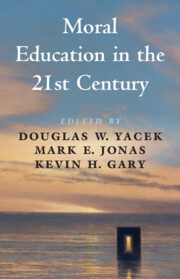Book contents
- Moral Education in the 21st Century
- Moral Education in the 21st Century
- Copyright page
- Contents
- Contributors
- Acknowledgments
- Chapter 1 Why Does Moral Education Matter in the 21st Century?
- Part I Historical Insights for Contemporary Moral Education
- Part II New Approaches to Moral Education
- Chapter 7 Liberal Authority and Moral Education
- Chapter 8 The Capability Approach as a Foundation for Moral Education
- Chapter 9 Recognition Theory and Moral Education
- Chapter 10 Practicing Care Ethics in the Current Context
- Chapter 11 A Non-Ideal Virtue Theory and the Centrality of Education
- Chapter 12 Pragmatist Moral Education
- Part III Responses to Contemporary Moral Problems
- Index
- References
Chapter 8 - The Capability Approach as a Foundation for Moral Education
from Part II - New Approaches to Moral Education
Published online by Cambridge University Press: 01 June 2023
- Moral Education in the 21st Century
- Moral Education in the 21st Century
- Copyright page
- Contents
- Contributors
- Acknowledgments
- Chapter 1 Why Does Moral Education Matter in the 21st Century?
- Part I Historical Insights for Contemporary Moral Education
- Part II New Approaches to Moral Education
- Chapter 7 Liberal Authority and Moral Education
- Chapter 8 The Capability Approach as a Foundation for Moral Education
- Chapter 9 Recognition Theory and Moral Education
- Chapter 10 Practicing Care Ethics in the Current Context
- Chapter 11 A Non-Ideal Virtue Theory and the Centrality of Education
- Chapter 12 Pragmatist Moral Education
- Part III Responses to Contemporary Moral Problems
- Index
- References
Summary
Educating responsible moral agents is a central goal of democratic societies committed to the values of justice, equality, and the promotion of individuals’ well-being. How best to pursue the goal through formal schooling is, however, highly debated in moral education, due to reasonable disagreement on values and how to impart them. This chapter suggests that the core concepts of the capability approach provide an ethical framework which can fruitfully inform moral education. The approach’s core idea of evaluating individual well-being and the justice of society in terms of capability, or the substantive freedom to choose one’s valued life, together with the concept of agency and the importance of rational deliberation, set the ethical foundations for educating morally responsible citizens, who consider and treat other people as moral equals, care for social justice, and value their own and others’ well-being.
Keywords
- Type
- Chapter
- Information
- Moral Education in the 21st Century , pp. 136 - 150Publisher: Cambridge University PressPrint publication year: 2023

